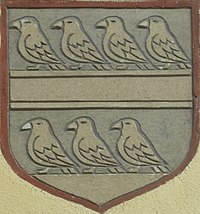Drugeth
| House of Drugeth | |
|---|---|
 |
|
| Country | Kingdom of Hungary |
| Titles |
|
| Founded | c. 1315 |
| Founder | Fülöp (Philip), Palatine of Hungary |
| Final ruler | Zsigmond II (executed) |
| Dissolution | 1684 |
The Drugeths were a noble family (of French origin) of the Kingdom of Hungary in the 14-17th centuries whose possessions were situated on the north-eastern parts of the kingdom. The ancestors of the family left Apulia (Italy) for Hungary during the reign of King Charles I. Several members of the family held high offices in the first half of the 14th century and later, when the Drugeth estates were the largest in all of Hungary. The family continued to be important until the male line died out in 1691.
The first member of the family establishing himself in the Kingdom of Hungary was Philip Druget (Hungarian: Druget Fülöp) (cca. 1288-1327) who accompanied the future King Charles I from the Kingdom of Naples to Hungary in 1300. He took part in the king's military campaigns against his opponents and the rebelling aristocrats. He led the king's armies, in 1317, against the rebellious Peter, son of Petenye (who possessed several castles in Zemplén county) and in 1320, against Matthew III Csák. He was the head (ispán) of the Counties Szepes (1315–1327), Abaúj (1317–1327), Gömör and Torna (1320–1327). Philipp was the Master of the Queen's Treasury (királynéi tárnokmester) between 1321 and 1327, when King Charles appointed him to Palatine (nádor); he hold the latter office until his death. King Charles granted him the possession of the Castles Barkó (Slovak: Brekov), Jeszenő (Slovak: Jasenov), Lubló (Slovak: Ľubovňa), Palocsa (Slovak: Plaveč), Szokoly (Slovak: Sokoľ) and Terebes (Slovak: Trebišov).
...
Wikipedia
